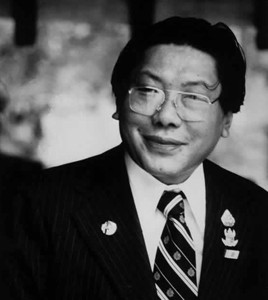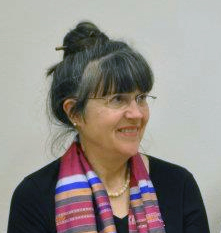Meeting a Warrior: Chögyam Trungpa
 It’s hard to say exactly when I met Chögyam Trungpa Rinpoche – was it when I read his first book Meditation in Action or when I heard his voice on tape? Or was it when I bumped into a smallish, strange Tibetan man dressed in khaki army clothes in the corridor of a hotel in Lake Louise?
It’s hard to say exactly when I met Chögyam Trungpa Rinpoche – was it when I read his first book Meditation in Action or when I heard his voice on tape? Or was it when I bumped into a smallish, strange Tibetan man dressed in khaki army clothes in the corridor of a hotel in Lake Louise?
Trungpa’s books had been under my pillow for ten years before I met him in person and during those years I had come to know that he was definitely my teacher. In 1981 I attended a three-month ‘seminary’ in Canada and finally met and studied with him.
The atmosphere at the seminary, which was held in a luxury hotel in the Canadian Rockies, was interesting: a mixture of incredible discipline and intense partying. In the practice periods we sat for ten hours a day and in the study periods we attended classes and gathered in the evenings for Trungpa Rinpoche’s talks in the main shrine room. Often the talks would be very, very late and just before he arrived the doors would be opened and we could look out over the frozen lake and mountains and feel the snow blowing in on an icy wind.
The talks were exciting; he had an incredibly powerful presence and the talks were articulate, logical and very funny. He seemed to be able to present the essence of the Buddhist teachings in a form that was completely accessible to Western minds. In the language of the time – it ‘blew my mind’ and I could not believe that other people were able to articulate questions.
Trungpa Rinpoche created a powerful environment in the shrine room and we soon forgot it was actually a hotel dining room. The banners lifted the atmosphere and the shrine was vibrant and glowing. Outside we could see massive snow covered mountains, a frozen lake and at the end of the lake, a turquoise glacier. Two of the Shambhala monastics were on staff – Pema Chödron taught one of my classes and a monk called Tsultrim had a parrot called ‘Stormy Weather’ which was allowed to fly round the shrine room.
Trungpa’s presence was, intense, warm, direct and disquieting. It’s very difficult to describe such an extraordinary man in a few short words. He had a disconcerting effect on people and I was quite scared of talking to him. At a reception to which I had been invited, I was persuaded by my room-mate to go up and meet him. (Actually she physically pushed me towards him). I had a glass of Drambuie in my hand and it had spilt onto my hands making them completely sticky. The first thing that Trungpa Rinpoche did was to hold my hands and he held them for twenty long uncomfortable minutes. In one sense it was acutely uncomfortable, but in another sense it was completely delightful.
There was a feeling when you were around him, that you took your life in your hands. He was direct, present and intense. His gaze was like a laser beam that cut through all of your masks and left you feeling naked and exposed. It was paradoxical; the experience of being so exposed was liberating but at the same time it was scary. You wanted to be close and you wanted to run away. I guess that would symbolise my relationship with Shambhala dharma altogether. Thank you Trungpa Rinpoche for inviting me into your amazing world.
 Jane Hope is a founding member of the London Shambhala Meditation Centre and author of The Beginners Guide to Buddhism. She studied fine art, and like many of her generation, became fascinated by Eastern religions and art.
Jane Hope is a founding member of the London Shambhala Meditation Centre and author of The Beginners Guide to Buddhism. She studied fine art, and like many of her generation, became fascinated by Eastern religions and art.
In the late 60’s, while living and working with an experimental theatre group and commune, the Exploding Galaxy, she started to hear rumours about an ‘interesting and outrageous young lama’ who was living somewhere in UK. This was Chögyam Trungpa.
Jane will be teaching a seven-day retreat, From Fear to Fearlessness, at Lamledra House on the South Cornwall coast from Sat 10th – Sat 17th October 2015.
The retreat will explore a series of transformational teachings called the Four Immeasurables, that can help us to go beyond fear by cultivating the four aspirations of maitri (loving-kindness), compassion, joy, and equanimity. These practices give us the strength and openness we need to go beyond our familiar habits and patterns.
If you are interested in attending this retreat and would like further details please email [email protected]



